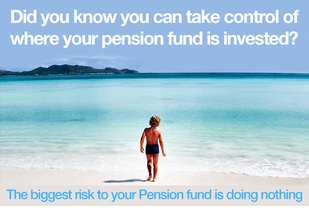|
An imposed workplace scheme is not the only option for retirement, as more low-cost Sipps come on to the market.
The financial pages have been full of advice on pensions with the launch of auto-enrollment last week. It has thrown a desperately needed spotlight on how and why we should be saving for later life. But not everyone is happy that the state is stepping in. If you want to take control for your own retirement saving, a self-invested personal pension or Sipp, could prove a compelling alternative. Sipps are essentially do-it-yourself pensions, offer more flexibility and a wider range of investment choices than most personal pensions. As well as cash, government bonds and funds, you can choose to invest your money in more complicated investments such as individual shares, open-ended investment companies (Oeics), commercial property and commodities. They still benefit from all the features of a more traditional pension, including up to 50 per cent tax relief on pension contributions, but instead of trusting the provider to pick funds, you decide how to invest your contributions typically with a much wider range of funds to choose from and the opportunity to invest in direct equities by buying and selling shares. It's true that when they first emerged, Sipps were targeted at experienced investors with substantial pension pots, but as costs have come down they have proven to be an increasingly popular choice among the general population. "The Sipp market has been revolutionised in recent years with the emergence of low-cost plans, which have made them accessible to the mass market. Sipps are now becoming ISA-like in their appeal," says Jason Hollands of independent financial adviser (IFA) Bestinvest. Follow the link for further information on SIPPs - LINK To read the article in full follow the link - LINK MILLIONS of new pensioners were warned this week that they face a retirement of poverty after weeks of slashed annual payouts.
Pension companies have cut rates offered on their guaranteed annuity incomes 24 times since the start of summer. Standard Life is the latest to do so, lopping five per cent off the rate offered to the newly-retired and those approaching retirement. And male pensioners will suffer an extra blow later this year with the introduction of the EU’s new “gender directive” which will further force down annuities for men. Craig Palfrey, founding partner of independent financial advisers Penguin Wealth, said: “Annuities are in meltdown. We’re way beyond red alert. They have been coming down relentlessly and Standard Life’s decision to take a sword to rates is just the latest example. Twenty years ago a £100,000 pension fund would have guaranteed an income of £15,640 a year for life for a 65-year-old man. Now it is just £5,140 a year. And the crisis decimating pensions is set to continue for months, perhaps even years, piling on the agony for the newly-retired. Experts warn that the situation is likely to worsen as annuity providers struggle with volatility in the stock market and the Bank of England’s quantitative easing (QE) strategy to tackle the recession. The money-printing policy has been attacked for triggering “a death spiral” in pensions, which some experts say has led to the worst retirement payouts in history. NOW is the time to take control of YOUR pension before it is too late - SIPP LINK. Millions will see pensions slashed by up to 20% as new EU rules are set to send annuities plummeting22/6/2012
MORE bad news on pension's!! TIME TO ACT!
Millions of people could see the value of their pensions slashed by up to 20 per cent because of new EU rules. Those with a £100,000 pension fund could be more than £1,100 per year worse off in retirement because of the reforms, research has shown. The Solvency II rules, which are due to come into effect in January 2014, will force pension funds to hold a higher proportion of 'safe' Government bonds. As the bonds - called gilts - have such low rates of return it will drive down the returns on retirement fund annuities, which are used to pension income. The reforms are designed to make pension funds safer and reduce the risk of them going bust. Annuities, which set retirement income for life, have already fallen to historic lows because of the impact of quantitative easing. At present, a pension annuity fund may invest 20 per cent in low-yield gilts and the rest in riskier corporate bonds which have a higher rate of return. But under the new EU rules, annuity funds will be forced to hold a higher percentage of gilts. New research by Deloitte suggests annuity rates will plunge by between five and 20 per cent when the directive comes into force in January 2014. A £100,000 pension pot currently gives an income of £5,837, but once the regulations come into effect they will be between £292 and £1,167 a year worse off. Take control of your pension by investing in Alternative Investments via a SIPP. LINK TO SIPP INFORMATION PAGE AND VIDEO - SIPP's LINK Read more: ARTICLE LINK The National Association of Pension Funds (NAPF), which represents almost 1,200 pension schemes with combined assets of nearly £800 billion, called on the Coalition Government to urgently boost confidence in the pension system or risk seeing millions of Britons slide into poverty in retirement.
In an annual survey, the NAPF found that the number of people who do not have confidence in the pension system outweigh the number of people who do. It is the first time in the survey’s four-year history that the balance has been in negative territory. Of some 900 working adults surveyed, almost half said that they are not confident in pensions as a means of saving money. This compares to just four in ten who said that they are confident. Last year the number of people who were confident outweighed those who were not by 5 per cent. The NAPF also found that only 35 per cent of people think that a pension is the best way to save for retirement. This has fallen from 45 per cent one year ago. Conversely, investing in property and ISAs has grown in popularity as a means of saving for retirement. Joanne Segars, chief executive of the NAPF, said that faith in pensions has slumped at a time when it should be growing. She said that the decline is particularly worrying because from next year millions of people will be auto-enrolled into workplace pensions which they clearly have “so little faith in”. According to the NAPF’s Pensions Confidence Index, three in ten Britons rate a pension as the most important benefit associated with their job, down from four in ten last year. Ms Segars said: “Politicians have to boost confidence in pensions, or people will simply opt out. We need a pension framework that the public can believe in and rely on. “We urge the Government to do more to fulfil its own pledge to reinvigorate pensions. It must get on with reforming the state pension by setting a simpler, single tier system. This would set a clear foundation for retirement on which people can build their workplace pension and savings.” The NAPF said that the economic downturn has eroded faith in pensions, and the recent sharp stockmarket falls have also put many people off. Hidden costs and the increased retirement ago are also behind the lack of faith. On top of this, squeezed household incomes and rising inflation mean that to too many Britons pension outlays can “seem like the weakest link” and are therefore cut. “The Government must stress the importance of saving,” said Ms Segars. Ros Altmann, director-general of Saga, the over-50s group, said a growing number of people had turned their backs on pensions after a series of scandals and amid increasing uncertainty over their jobs. “People don’t have confidence in pensions,” she said. “We need to wake up to what is happening to savings. We have moved away from a culture of saving towards a culture of debt. “If an advisor is advising you to put money into a pension it requires reams of paperwork but, until the credit crisis, it was very easy to borrow hundreds of thousands of pounds you could never pay back.” In the summer an independent report into the state of pensions in the UK found that almost three quarters of private sector workers will be unable to “adequately exist” when they retire due to a low level of savings and the complex, costly and inefficient pensions system. The report by the Workplace Retirement Income Commission said that millions of workers who retire after 2020 should expect a “bleak old age”. Steve Webb, Pensions Minister, said last night: "We entirely agree that more needs to be done to boost confidence in pensions. We’re working on plans to simplify the state pension – providing a firm foundation on which to save ahead of the introduction of automatic enrolment." By James Hall and Tim Ross, Consumer Affairs Editor The Telegraph. link -http://www.telegraph.co.uk/finance/personalfinance/pensions/8774970/Confidence-in-pensions-hits-record-low.html. ACT NOW take control of your pension invest in a SIPP, insurance backed investments paying up to 24% over 24 month and several other alternative investments to consider. - LINK |
AuthorInvestment Property Worldwide will try bring to you a diverse range of property, investment news. Archives
October 2014
Categories
All
|
| Investment Property Worldwide.com |
|



 RSS Feed
RSS Feed
